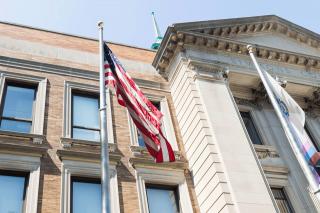Faculty from the Department of Politics and Policy at Simmons recently presented a virtual panel discussion on the upcoming presidential election. Panelists included Associate Professor Abel Djassi Amado, Joan M. Warburg Professor of International Relations Ambassador Jeffrey DeLaurentis, Associate Professor and Department Chair Lena Zuckerwise, and Associate Provost of Academic and Faculty Affairs Leanne Doherty.
Associate Professor Abel Djassi Amado began the discussion by addressing the use of specific language as a tool to mobilize certain sectors of voters. “It is clear to me that we are observing the old methodology of the politics of scapegoating,” he said, particularly in regards to recent rhetoric from the Republican candidate about Haitian immigrants during the Presidential debate. While scapegoating has been present in American politics over the last 200 years, he observed “an intensification” of the use of this language. “What we are experiencing here is what I call the process of ‘evil-ing,’ [which is] a new dimension of othering,” said Amado. “It’s making the other the source of all evils that society is facing in order to mobilize voters, in order to incite them to vote for a particular candidate.”
Ambassador Jeff DeLaurentis stated that this is the most consequential election he has experienced in his lifetime (even more so than the 1968 election during the Vietnam War). “The political gridlock is very real,” he said. “The country has traditionally been governed from the middle [political centrism, as opposed to reactionary or revolutionary politics] and this is being profoundly challenged. The notion of bipartisan approaches to solve the country’s problems seem more and more unobtainable. It feels like we have two fundamentally different visions for the future of the country.” DeLaurentis noted that the Republican party itself has changed significantly, referring to a number of mainstream Republicans who are not supportive of the current Republican candidate.
Associate Provost Leanne Doherty noted that, given the economic difficulties and bombardment of information that put pressure on the American populace, she is not surprised that this race is close. She also noted that there is a “relatively new phenomenon” of targeting particular groups [soccer moms, NASCAR dads, GenZ voters, for example] whose votes, en masse, could change the outcome. While she emphasized that every vote is important, Doherty said that White college-educated men — a cohort that the Democrats have lost over the past several years — have been influenced by the recent debate around reproductive rights. “Storytelling has become incredibly important in U.S. politics, and the stories that are being told of women losing their lives for being denied healthcare resonate with White college-educated men.”
Associate Professor Lena Zuckerwise offered her own take on the peculiarities of this presidential race. Though Trump’s attacks on mainstream media have engendered stark differences in messaging from opposing news outlets, Zuckerwise noted that Trump is only part of the reason why democratic principles are being uniquely tested in these moments leading up to the 2024 election. She points to the rise of neoliberalism in the 1970s, an economic theory that unchecked and unregulated markets would produce the best quality of life for people. As a result, public services were replaced with private ones. “Today, because of unchecked corporate power, as well as hugely powerful lobbies from guns to tobacco to oil, the government is in a relatively disadvantaged position to act on the will of the people,” said Zuckerwise. As one of many potential examples, she noted the lack of common sense gun control laws in the United States — an issue that the majority of Americans support — because the National Rifle Association (NRA) spends millions of dollars lobbying in Washington every year, donating to campaigns of politicians on the condition that they suppress gun control legislation. “The point of this is that none of that reflects the actual will of the people, only the power of special interest elites.”
Doherty turned to the topic of social media and increased access to information. She noted that, while the internet offers opportunities for information sharing and the spread of diverse perspectives, it can also be used to affirm pre-existing beliefs. “You can go on the internet and find something to prove how you feel about any situation,” said Doherty. “This is why the rise of conspiracy theories shouldn’t shock anyone right now, because it’s about beliefs as opposed to facts,” and, therefore, political discussions are hard to depolarize. Moreover, she advised the audience to be aware of the difference between journalism and punditry.
“It doesn’t hurt to get news about American politics from abroad,” said Amado. DeLaurentis agreed, urging people to listen to BBC News for a more objective outlet. Above all, the panelists urged the Simmons community to go out and vote in this most important election of our lifetimes.

